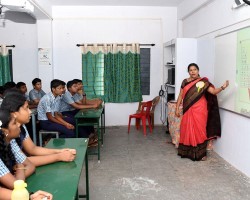Banking Current Affairs
| Polity and Governance |
|---|
|
|
|
The Smart Cities Mission (SCM), launched by the Ministry of Housing and Urban Affairs in June 2015, has been instrumental in modernizing urban education infrastructure through initiatives like smart classrooms and digital libraries. A recent study by the Indian Institute of Management, Bangalore, highlights the significant impact of these initiatives.
Key Highlights Smart Classrooms Initiative: Impact on Enrolment: A 22% increase in enrolment in government schools between 2015-16 and 2023-24, as reported by 19 cities. Scale of Implementation: 71 cities developed 9,433 smart classrooms across 2,398 government schools. Top States: Karnataka leads with 80 smart classroom projects, followed by Rajasthan (53), Tamil Nadu (23), and Delhi (12). West Bengal is among the lowest, with only 2 projects. Teacher Feedback: Teachers report improved learning experiences and attendance due to smart classrooms. Special training enhanced teachers' comfort in using smart classroom technology, with senior secondary teachers showing the highest preference. Digital Libraries: Infrastructure: 41 cities developed 7,809 seats in digital libraries. Notable Examples: Cities like Raipur (Chhattisgarh) and Tumakuru (Karnataka) have significantly supported students preparing for competitive exams through digital resources. Smart Cities Mission Overview: Objective: Promote cities with core infrastructure, a decent quality of life, and a clean, sustainable environment using "smart" solutions. Progress: As of November 2024, 91% of projects under SCM have been completed. SAAR Initiative (2022): Platform to bridge academia and government for urban innovation research. 50 impact assessment studies initiated under the “Sameeksha Series,” involving: 6 Indian Institutes of Management (IIMs). 8 Indian Institutes of Technology (IITs). 3 Schools of Planning and Architecture. 12 specialised research institutes. Significance Educational Transformation: Smart classrooms and digital libraries are enhancing access to quality education and improving enrolment in government schools. Capacity Building: Teacher training initiatives are fostering the effective use of digital tools, aligning with modern educational standards. Urban Development and Education. Integration of education reforms into urban planning reflects the mission's holistic approach to development. Challenges Unequal Distribution: States like West Bengal have limited smart classroom projects, indicating potential disparities. Sustainability: Long-term maintenance of infrastructure and digital resources remains a challenge. Way Forward Focus on Lagging States: Ensure equitable implementation across all States, especially those with fewer projects. Enhanced Collaboration: Strengthen the SAAR initiative to include more research and feedback from local stakeholders. Sustainability and Scalability: Develop strategies for sustainable operations and expansion of smart classroom initiatives. |
| >> More Banking Current Affairs |
